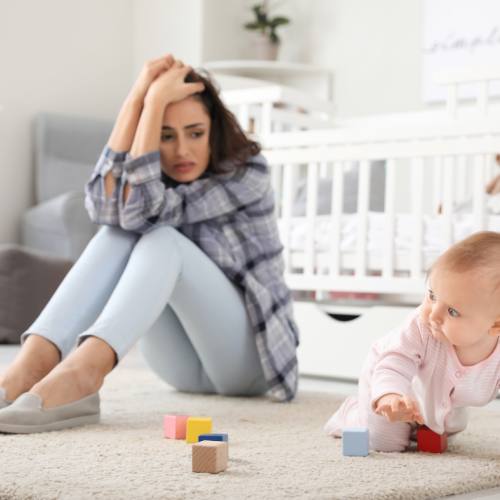Postpartum Depression
The birth of a baby can trigger a mix of strong emotions, from excitement and joy to fear and anxiety. But it can also lead to something you might not expect – depression.
Most new moms experience the “baby blues” after giving birth, manifesting in mood swings, crying spells, anxiety and sleep disturbances. The baby blues usually begin within the first two to three days after delivery and can last up to two weeks.
However, some new mothers suffer from a more severe, long-lasting form of depression called postpartum depression. In rare cases, extreme mood disturbance can also occur after childbirth, known as postpartum psychosis.

Symptoms
Signs and symptoms of depression after childbirth vary, and they can range from mild to severe.
Baby blues – which last only a few days to a week or two after your baby is born. These include:
- Mood swings
- Anxiety
- Sadness
- Irritability
- Feeling overwhelmed
- Crying
- Reduced concentration
- Appetite problems
- Trouble sleeping
Postpartum depression – can initially be confused with the baby blues, but the signs and symptoms are more intense and last longer. They may eventually interfere with your ability to care for your baby and perform other daily tasks. Symptoms usually appear within the first few weeks after birth, but can begin earlier, even during pregnancy, or up to a year after birth. These symptoms include:
- Depressed mood or severe mood swings
- Excessive crying
- Difficulty bonding with your baby
- Withdrawing from family and friends
- Loss of appetite or eating much more than usual
- Inability to sleep (insomnia) or sleeping too much
- Overwhelming fatigue or loss of energy
- Reduced interest and pleasure in activities you used to enjoy
- Intense irritability and anger
- Fear that you’re not a good mother
- Hopelessness
- Feelings of worthlessness, shame, guilt or inadequacy
- Diminished ability to think clearly, concentrate or make decisions
- Restlessness
- Severe anxiety and panic attacks
- Thoughts of harming yourself or your baby
- Recurrent thoughts of death or suicide
- Untreated, postpartum depression may last for many months or longer
Postpartum psychosis – a rare condition that typically develops within the first week after delivery. Symptoms include:
- Confusion and disorientation
- Obsessive thoughts about your baby
- Hallucinations and delusions
- Sleep disturbances
- Excessive energy and agitation
- Paranoia
- Attempts to harm yourself or your baby
- Postpartum psychosis may lead to life-threatening thoughts or behaviours and requires immediate treatment
Causes of postpartum depression
There is no single cause of postpartum depression, but physical and emotional problems may play a role.
Physical changes – After giving birth, a dramatic drop in hormones (estrogen and progesterone) in your body can contribute to postpartum depression. Other hormones produced by your thyroid gland may also drop sharply – causing you to feel tired, sluggish, and depressed.
Emotional issues – If you are sleep-deprived and overwhelmed, you may have difficulty coping with even minor problems. You may be worried about taking care of a new-born. You may feel less attractive, have problems with your sense of identity, or feel like you have lost control of your life. Any of these problems can contribute to postpartum depression.
Treatment and prevention of postpartum depression
If you have suffered from depression in the past, especially postpartum depression, you should inform your doctor if you plan to become pregnant or as soon as you learn that you are pregnant.
During pregnancy – your doctor can monitor you closely for signs and symptoms of depression. They may ask you to fill out a questionnaire about depression during pregnancy and after delivery. Sometimes mild depression can be treated with support groups, counselling, or other therapies. In other cases, antidepressants may be recommended – even during pregnancy.
After your baby is born – Your doctor may recommend an early postpartum exam to detect signs and symptoms of postpartum depression. The earlier it is detected; the sooner treatment can begin. If you have experienced postpartum depression, your doctor may recommend treatment with antidepressants or psychotherapy immediately after delivery.
Treatment at A7 Health to start Exercising after Pregnancy:
Get Physiotherapy – Book an appointment with a Physiotherapist at A7 Health who will assess you in a 45 minute consultation and provide you with treatment alongside a treatment plan to manage your pain. Some of the treatments include:
- Lower back mobility exercises.
- Massage.
- Mobilisations on any stiff joints such as your hips, lumbar spine joints or the sacroiliac joint (SIJ).
- Pelvic floor strengthening exercises.
- Strengthening exercises for your abdominal muscles.
- Practice relaxation techniques.
- Prevent or treat urinary incontinence.
- Relieve back pain.
- Relieve pain during sexual intercourse.
Join an exercise class (with a Biokineticist) – Moderate exercise, such as walking, has been shown to help relieve back and pelvic pain during pregnancy. Stretching can help relieve sore muscles. Join an exercise class led by an A7 Health Biokineticist who will teach you exercises that will strengthen and relax muscles and help you to reduce the likelihood of pain after pregnancy. These exercises will also help you with recovery after you give birth.
